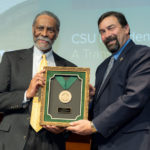State Classified performance evaluations are right around the corner. CSU Human Resources would like to dispel a few myths surrounding the review process and the steps you can take to make the most out of your review.
Myth 1:
A Supervisor’s decision to give out a “3” rating will be scrutinized by HR and discouraged. NOT SO!
There should be a performance plan for an employee that clearly de nes what type of work duties will qualify for a “3” rating. The employee should be able to meet with their supervisor and have it communicated to them if they are on par with what would be considered Exceptional Performer status as de ned by state personnel rules.
It is up to the supervisor to communicate those expectations and work with employees who want to achieve that level and help them get there.
An employee looking to perform at a high level should be encouraged to do so and rewarded with a “3” rating if benchmarks for that rating are met. There are no “quotas” for any rating in the system, and there is no directive from HR limiting how many 3s (or any other level) in existence.
Myth 2:
By not signing my performance review form, I am “officially” disputing my rating. NOT SO!
If you disagree with your performance rating, you must initiate a formal dispute by completing a CSU Performance Management Dispute Resolution Form ( hrs.colostate.edu/pdfs/ form-performance-management- dispute-resolution.pdf ) and provide it to your supervisor within three working days of the event which resulted in the disagreement.
According to State Department of Personnel guidelines, issues that may be disputed are:
• The employee’s performance plan (or absence of a plan);
• The final overall performance evaluation rating, including lack of a nal overall evaluation;
• The application of the CSU Performance Management Program to the employee’s plan and/or nal overall evaluation; and,
• Complete payment of the performance salary adjustments as per the CSU/PMP.
The following matters are not disputable:
• The content of the CSU Performance Management Program;
• Matters related to the funds appropriated;
• The performance evaluations and performance salary adjustments of other employees;
• The amount of a performance salary adjustment, unless the issue involves the application of the CSU Performance Management Program.
Myth 3:
There is nothing I can do to in uence salary increases because the Colorado Department of Personnel and Administration dictates how much I will receive. NOT SO!
Although the State Personnel director speci es and publishes the percentage ranges for performance levels, the amount is determined by your state legislators. Contact your legislators (eg.colorado. gov/ nd-my-legislator) and your governor (colorado.gov/governor/ contact) and let them know what an increase means to you.
Your supervisor must review your Position Description Questionnaire (PDQ) when planning for the upcoming performance cycle. Ask to participate in that review and make sure your PDQ is up to date. If our job has changed significantly, you may ask to submit an updated PDQ for review to determine if the changes warrant a promotion. Employees who promote via individual position audit (PDQ review), may receive an increase of up to 10% over the employee’s current salary Your review and planning discussions are also an opportunity to speak to your supervisor about professional goals and begin a dialogue about how to grow in your current role, prepare for a new role or develop more skills, all of which can help position you for advancement.
Myth 4:
Employees cannot direct their own performance management plan. NOT SO!
A good performance management program inspires employee commitment through participation, and also includes self-evaluation by employees who have an understanding of their place in the organization and their contribution to its success through active participation in the planning process. Employees should be involved in all aspects of the performance management process for their work.



































































































